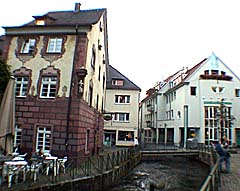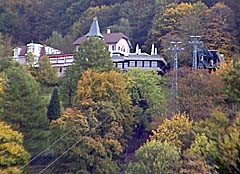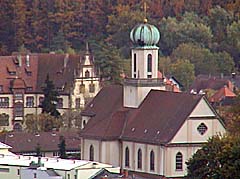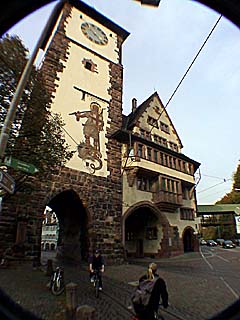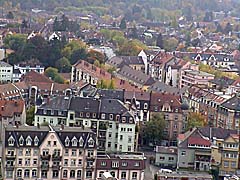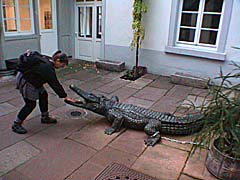
Week 4, part 6
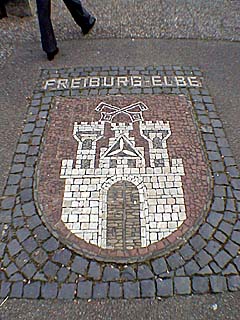 Artwork can be found in the cobblestones all over Freiburg.
A main channel of Freiburg's canal system makes its way past a cafe as it enters the center of the city.
The gondola that we did not ride leading to the restaurant where we did not eat.
Onion-shaped church steeples are common in this part of Europe.
|
Shortly before 10:30 we arrived in Freiburg. The Geldautomat (money machine) would not issue us any Deutchmarks, reporting that it was "incapable" of doing so. (The next day we were able to cash in our leftover Francs and get some Marks without incident) And we had no way of buying food at the station, or making a phone call to Bobber, who hadn't shown up yet. As Obbie was negotiating with the Geldautomat, Bobber and Elena showed up and brought us to their place. Friday they took us on a walking tour of central Freiburg. This city is not much bigger than La Crosse, but the level of activity in the central city makes it feel more like Madison. Most of the central core of Freiburg remains as it has for hundreds of years. The wide area of pedestrianised streets retains its cobble stone pavement. Part of the river through the city is diverted into a network of canals and gullies that follow the streets and keep the city "flushed out." This is how Freiburg survived the Plague hundreds of years ago. Nothing of quality is allowed to deteriorate, so the city's old buildings have a new look to them. Gentrification in Freiburg involves rehabilitation every generation or two, rather than the cycle of demolition and rebuilding that plagues other cities (such as ours). Just before we left home, we learned that the mayor of La Crosse had been on a city-sponsored visit to Freiburg. We hope that he took special note of some of the innovations that make central Freiburg the thriving place that downtown La Crosse wishes it could become. A network of street cars serves as the backbone of an extensive local transit system. A central train station with 8 platforms brings in commuters who are not served by the local transit system (trains to and from most destinations run at least hourly). Hundreds (thousands?) of bicycles are parked in racks near the station (including a sizable indoor garage with space for several hundred bikes), kept there by commuters and travellers to easily get to where they're going in Freiburg upon arrival. Seemingly every major street has a well-marked bike lane, and bicycles far outnumber cars in both driving and parking areas. Those who insist on driving cars into Freiburg are shunted to parking areas scattered around the perimeter of the central city, so that the hordes of workers and shoppers walking the cobblestone streets can do so without being hindered or put at risk by traffic. Computerized signs on the approaching highways inform drivers which parking areas have the most available space. The biggest hazard to pedestrians in Freiburg are the bicycles, especially at night. On Saturday we caught up on sleep, laid low, and took a late afternoon walk to the park, frisbee in hand. After we had been throwing for a while we were approached by a 10-year-old local boy who asked us where we were from. As the conversation developed, four more boys showed up. We exchanged names and ages, and Obbie tried to tell the story of having two German grandfathers. Their English was sketchy, but it was a lot better than our German, and we wondered how many American kids their age (other than Hispanics) are this bi-lingual. We got the kids to fan out across the lawn to participate in our frisbee throwing/chasing exercise, at which they displayed a surprising level of experience and competence. As we walked back toward Bobber's house, we thought of Tobias, Andreas, Marko, Steven, Sacha, and how they were probably excitedly telling their parents about the American couple they'd played frisbee with in the park. In most of America local kids (or at least their parents) and passing travellers are too afraid of each other for this kind of interaction to have happened. We worry about how these kids are going to avoid the demon tobacco. Outdoor cigarette machines are all over the place. They may say that the coin slots are too high for kids to reach, but anyone who's ever been a kid wanting smokes knows that they will find a way up there. We've been told that long cigarette ads are among the half hour of commercials one must sit through before seeing a film in a German theatre. Among the things advertised are dude ranches in Wyoming where the brand is emblazoned on everything - including the name of the ranch - and where Europeans are encouraged to go on vacation. Long "recruitment" ads ask students to apply to work at these ranches. Of course only 30-50 kids are lucky enough to get the jobs ... the tens of thousands that don't make the cut get targeted with marketing materials. The tobacco marketing practices in America stink badly enough, here they border on pure evil. Sunday was a day for walkies. Freiburg sits at the edge of the Rhine Valley, next to the bluffs that mark the beginning of the Black Forest (Bobber says he's had a hard time explaining 'bluffs' to German-speaking people). We passed the gondola car that can take "cheaters" to a building made to look like a castle about halfway up the hill, where those with deep pockets can dine in a foo-foo restaurant with a panoramic view of the Freiburg rooftops. We took the footpath to a place with a better view of the rooftops, and took note of the many other people doing the same thing. We were told that this is German custom ... rather than retire to the tv room, families will typically walk together for hours after supper. No wonder most of the Germans are so healthy and strong. We've learned the meaning of "continental breakfast." Ever since we've come to the continent, breakfast has consisted of juice, coffee and bread with jam and/or cheese, depending on the locality. We've also learned that the German language is much easier to understand than it is to read or speak. We've actually been able to understand announcements on the train platforms, which we're told is something that even locals have a hard time with. German can also be a lot of fun. People who drive cars here do a lot of fahrting. ('Fahren' is the German verb for 'to go' if you drive or ride in/on some sort of vehicle) Autobahns and parking ramps are entered through the einesfahrt and exited through the ausfahrt. If you ride your bike to a nearby store for a six-pack, you are on a bierfahrt. Sorry, but that's how 'beer run' translates to German. The word "Rathaus" is a permanent addition to our vocabulary ... it's German for "city hall." The house in which we were staying was preparing for a Halloween party Wednesday night. We figured we had just enough time for a side trip to Switzerland. On Monday morning we did a couple of errands, most important of which was to go to the Post Office. We'd gathered from our packs about five pounds of maps, receipts, and other printed matter that we no longer needed to carry. These things all got stuffed into a yellow box and put on a slow boat home, and our loads were lightened a bit. Early in the afternoon we said some good-byes and jumped on the next south-bound train.
Next week we'll tell you all about our adventures in Switzerland and Bavaria, as well as our experience in getting this letter pushed through the wires. We apologize to those who may have written to us since the week 3 update was issued, but we have not had a chance to check incoming mail since then. If you are reading this now, then we are reading your mail and should reply shortly. Thanks to all who are keeping us up-to-date on things at home and elsewhere; we enjoy hearing from all of you. |
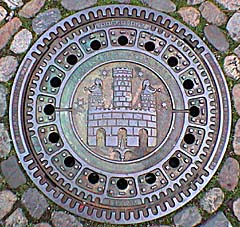 This manhole cover is also unique to Freiburg.
There is a long and complicated story behind Schwabentor Gate, but spelling the name is long and complicated enough.
After climbing the hill overlooking Freiburg, we were rewarded with this and many other views of the city.
RoZ tries to feed a bronze alligator in a Freiburg courtyard. Note the chain preventing the gator from escaping.
|
Week 5 takes us to the Swiss and Bavarian Alps, and on to Munich.
Previous page
week 4 index
purplearth 2001 europe oddyzee index
purplearth home
